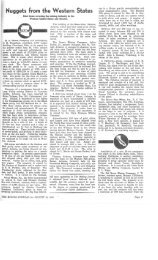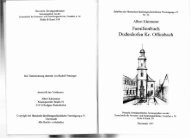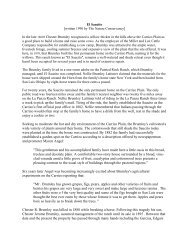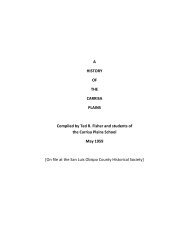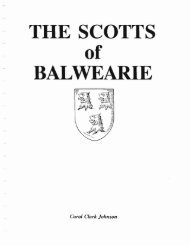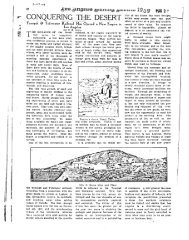Selected Articles from "The Mining Journal" 1944 ... - Vredenburgh
Selected Articles from "The Mining Journal" 1944 ... - Vredenburgh
Selected Articles from "The Mining Journal" 1944 ... - Vredenburgh
Create successful ePaper yourself
Turn your PDF publications into a flip-book with our unique Google optimized e-Paper software.
ADDISON N. CLARK· spotlights the .<br />
12-State Western <strong>Mining</strong> ConFerence<br />
KEYNOTE and dominant highlight of<br />
the two-day San Francisco conference<br />
was the resolution, passed unanimously,<br />
demanding that a sound money.<br />
hard money foundation be laid for any<br />
worldwide structure for postwar economic<br />
security. Lord Keynes' paper-currency<br />
ideas had more holes shot in them at San<br />
Francisco than they did at Bretton Woods<br />
and in commentators' columns combined.<br />
As a flavoring, the terse remarks by Governor<br />
E. P. CarviUe of Nevada-naturally<br />
urging a bimetallic hard-money standard<br />
-highlighted the highlight.<br />
' 4Sinee gold and silver," said Governor<br />
Carville, "have been the standard in the<br />
world for a period of 3,000 years, it is<br />
pretty hard now to throw them out the<br />
window and get some other base for the<br />
monetary world. We of the West must<br />
fight to retain gold and silver not only<br />
as the monetary base of the United<br />
States, but of the world."<br />
<strong>The</strong> sound money resolution "plank"<br />
took a full-arm swing at the whole Bretton<br />
Woods party. One pithy phrase in it<br />
was that Hprinting-press currency is not<br />
desired by the average American, nor<br />
does he want the currency of the United<br />
States debased by any international group<br />
of experts." And, added the resolution :<br />
uExperiences of the world with greenbacks<br />
after the Civil War, and with worthless<br />
Gerinan marks after World War I, were<br />
disastrous and caused a lack of confidence<br />
in 'managed currency plans'."<br />
Second in importance was the resolution<br />
passed concerning the War Production<br />
Board's directive which cited gold mining<br />
as "non-essentia1." <strong>The</strong> resolution termed<br />
this directive "unjust discrimination," and<br />
demanded rescission of WLB Order L-208<br />
which so completely and effectively<br />
throttled big gold mines, little gold mines,<br />
and even prospecting for gold.<br />
Spicy hot-sauce was added to the gold<br />
mining resolution with the terse assertion<br />
that "bartenders are not called Inon-essen<br />
,tiai' (Le., by the WPB), but gold mining<br />
is."<br />
Right along this same line was the memorializing<br />
of President Roosevelt to<br />
"make free markets for gold in foreign<br />
countries available to American gold producers.<br />
and to permit export of newly<br />
mined gold!' It was a timely suggestion<br />
to the president to remember-when he's<br />
in sessions with Messrs. Churchill and<br />
Stalin and Premiers McKenzie King and<br />
Jan Smuts of the gold-producing commonwealths,<br />
et ai-that these westarn goldproducing<br />
states ' have potential bi1lions of<br />
dollal"s in gold yet underground to match<br />
with those 22 billions down cellar in Kentucky.<br />
Gold today is selling at <strong>from</strong> $40<br />
to $80 an ounce in India, Egypt, Turkey,<br />
Asia Minor (to Britain's benefit) while<br />
our gold mining is stymied.<br />
·Couulting <strong>Mining</strong> Engin •• r<br />
Oakland. CaUlomla<br />
THE- MINING JOURNAL· I"" AffGtIST 30, 1' •• :<br />
Official delegates <strong>from</strong> 12 western<br />
stales gathered in San Francisco<br />
August 10 and 11 to discuss<br />
the postwar problems 01 mining.<br />
<strong>The</strong> situation was termed a perilous'<br />
one <strong>from</strong> both industrial and<br />
economic angles. as well as <strong>from</strong><br />
the employment-ol-Iabor angle.<br />
OVERNOR EARL WARREN of Cali<br />
G fornia and Governor E. P. Carville of<br />
Nevada called the conference, requesting<br />
five-man delegations <strong>from</strong> a dozen states<br />
-Arizona, Nevada, California, Oregon,<br />
Washington, Idaho, Utah, Montana, Colorado,<br />
New Mexico, Wyoming, 'and South<br />
Dakota. Governor Warren, in his welcoming<br />
talk, recalled the gold rush days<br />
of 'forty-nine and the early 'fifties. He<br />
then added that "great as was the gold<br />
rush, the rush of war workers to this<br />
western country in the last four years<br />
will have as profound an effect on the<br />
future of the state."<br />
"I am one of those," he said, "who believe<br />
this country has all the potentialities<br />
of an empire, and in any other part of<br />
the world it would be an empire. I can<br />
see the day when there will be not 15,-<br />
000,000 but 50,000,000 people living west<br />
of the Rockies." As to postwar days, he<br />
added: "We must have 1,500,000 new<br />
jobs after the war is over if we are to<br />
avoid one of the most calamitous unemployment<br />
situations we ever have seen."<br />
I am sure that the governor, as<br />
chief executive of a great gold-mining<br />
state, realizes that restoration of<br />
gold mining will recreate many thousands<br />
of potential and actual postwar<br />
jobs.<br />
ITAL need for freezing the nation's<br />
V war-born stockpiles of strategic metals<br />
-with the accent on copper-was stressed<br />
by G. A. Ballam of Tucson, field engineer<br />
of Arizona's Department of Mineral Resources.<br />
Copper men of Arizona, said<br />
Ballam, foresee a shutdown of her own<br />
copper mines and those of other copper<br />
states, Montana and Utah" if the refrigeration<br />
is· not turned on promptly.<br />
BaHam's statement of' the case was<br />
pointed up sharply by S. H. Williston of<br />
Portland, Oregon, who prepared the resolution<br />
asking the western governors to<br />
urge freezing of all government-owned<br />
strategic metals stockpiles.<br />
"Unless we get frozen stockpiles in the<br />
next four months," said Williston, "we<br />
are all broke!"<br />
During the discussion, the Arizonans<br />
told the conference that the single factor<br />
of back-flow of scrap metals <strong>from</strong> overseas<br />
battlefields threatens closure of Arizona's<br />
mines for up to three years.<br />
<strong>The</strong> situation was termed truly a perilous<br />
one <strong>from</strong> the industrial and economic<br />
angles, and just as perilous <strong>from</strong> the employment-of-labor<br />
angle. Manifestly it<br />
calls for fast action and continuous alertness.<br />
It· affects not only our own mining<br />
industry, but many interlocked ones.<br />
It could play hob, for example, with<br />
Arizona's great and growing citrus and<br />
date industries, her cotton growing industry;<br />
her now-humming cattle industry j and<br />
Lord knowR what others. It can raise<br />
just as much hob with the agriculture and<br />
manufacturing industries of those other<br />
11 western mining states named and represented.<br />
Realization of that "interlocking" aspect<br />
which ties the West's mining industry<br />
inescapably to other industries was manifest<br />
in all else brought up and discussed<br />
at the San Francisco conference. As a<br />
result the conference hit and hit hard on<br />
related subjects.<br />
Most important, of course, was that of<br />
taxation. <strong>The</strong> Oregon delegation urged,<br />
in a unanimously accepted resolution, that<br />
drastic alteration in federal tax laws be<br />
accomplished promptly, to "lift the ceiling<br />
on initiative and release venture capital."<br />
That resolution was not confined<br />
merely to revision of taxation directly affecting<br />
mining. It declared that free enterprise<br />
is endangered by federal income<br />
taxes, excess profits taxes, and capital<br />
stock taxes, if they are continued after<br />
the war at today's rates.<br />
Another resolution, striking at late<br />
rulings by the National Labor Relations<br />
Board and of the wage and hour administrators<br />
of the government, dell1ande-d<br />
limitation of retroactive back pay in labor<br />
disputes to six months. Such rulings as<br />
were under criticism were bluntly charged<br />
with imposing "undue hardships" on the<br />
industry.<br />
If the reverberations of that male<br />
chorus, assembled <strong>from</strong> the key states of<br />
a truly awakened West, do not echo and<br />
re-echo through administrative and legislative<br />
halls at Washington, then this writcr<br />
is having hallucinations. <strong>The</strong>se states,<br />
col1ectively, are the source of such an<br />
enormous majority of the nation's basic<br />
minerals and nOllferrous metals that the<br />
heads of Wall Street cartels, as well as<br />
their political coworkers at Washington,<br />
may well bend attentive ears to those<br />
echoes. Incidentally, such senator::J and<br />
representatives <strong>from</strong> any of t.hese 12 stntes<br />
as may not yet be awake to what it's all<br />
about would do well to bend their own<br />
ears . . . likewise their energies.<br />
<strong>The</strong> problems discussed are the one::;! on<br />
which we hardrock miners must get hardboiled,<br />
NOW, and for the. duration, and<br />
for a long time after the peace comcs.<br />
Remember those stockpiles and the huge<br />
tonnage of salvaged scrap metals. <strong>The</strong>y<br />
should STAY IN STOCKPILES, protor.tion<br />
against a war yet to come, and not<br />
to be dumped on the market to ruin the<br />
nation's vital mining industry.<br />
Page 9 ·



